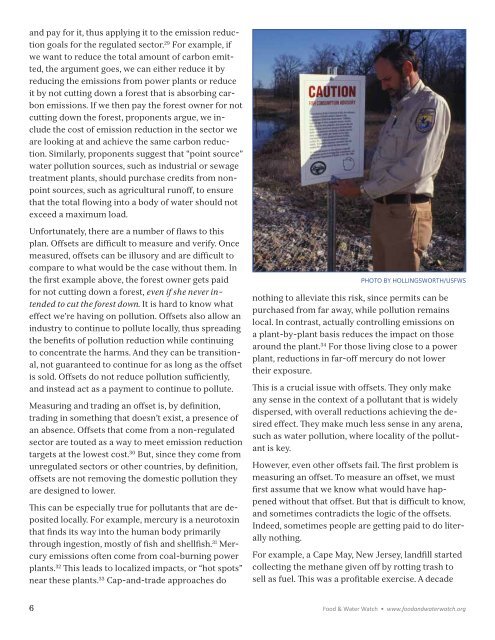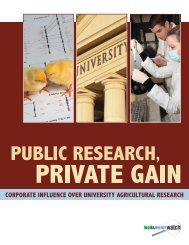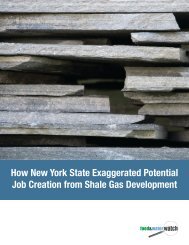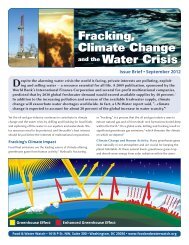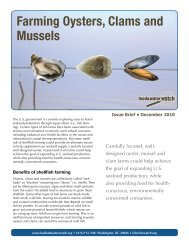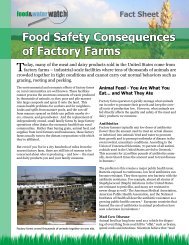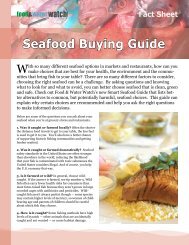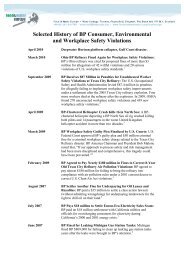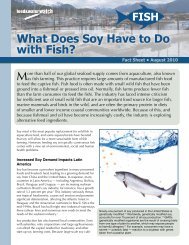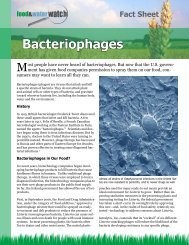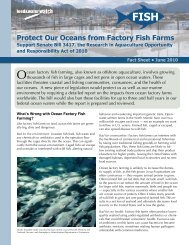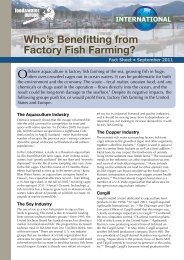Bad Credit - Food & Water Watch
Bad Credit - Food & Water Watch
Bad Credit - Food & Water Watch
Create successful ePaper yourself
Turn your PDF publications into a flip-book with our unique Google optimized e-Paper software.
and pay for it, thus applying it to the emission reduction<br />
goals for the regulated sector. 29 For example, if<br />
we want to reduce the total amount of carbon emitted,<br />
the argument goes, we can either reduce it by<br />
reducing the emissions from power plants or reduce<br />
it by not cutting down a forest that is absorbing carbon<br />
emissions. If we then pay the forest owner for not<br />
cutting down the forest, proponents argue, we include<br />
the cost of emission reduction in the sector we<br />
are looking at and achieve the same carbon reduction.<br />
Similarly, proponents suggest that “point source”<br />
water pollution sources, such as industrial or sewage<br />
treatment plants, should purchase credits from nonpoint<br />
sources, such as agricultural runoff, to ensure<br />
that the total flowing into a body of water should not<br />
exceed a maximum load.<br />
Unfortunately, there are a number of flaws to this<br />
plan. Offsets are difficult to measure and verify. Once<br />
measured, offsets can be illusory and are difficult to<br />
compare to what would be the case without them. In<br />
the first example above, the forest owner gets paid<br />
for not cutting down a forest, even if she never intended<br />
to cut the forest down. It is hard to know what<br />
effect we’re having on pollution. Offsets also allow an<br />
industry to continue to pollute locally, thus spreading<br />
the benefits of pollution reduction while continuing<br />
to concentrate the harms. And they can be transitional,<br />
not guaranteed to continue for as long as the offset<br />
is sold. Offsets do not reduce pollution sufficiently,<br />
and instead act as a payment to continue to pollute.<br />
Measuring and trading an offset is, by definition,<br />
trading in something that doesn’t exist, a presence of<br />
an absence. Offsets that come from a non-regulated<br />
sector are touted as a way to meet emission reduction<br />
targets at the lowest cost. 30 But, since they come from<br />
unregulated sectors or other countries, by definition,<br />
offsets are not removing the domestic pollution they<br />
are designed to lower.<br />
This can be especially true for pollutants that are deposited<br />
locally. For example, mercury is a neurotoxin<br />
that finds its way into the human body primarily<br />
through ingestion, mostly of fish and shellfish. 31 Mercury<br />
emissions often come from coal-burning power<br />
plants. 32 This leads to localized impacts, or “hot spots”<br />
near these plants. 33 Cap-and-trade approaches do<br />
PHOTO BY HOLLINGSWORTH/USFWS<br />
nothing to alleviate this risk, since permits can be<br />
purchased from far away, while pollution remains<br />
local. In contrast, actually controlling emissions on<br />
a plant-by-plant basis reduces the impact on those<br />
around the plant. 34 For those living close to a power<br />
plant, reductions in far-off mercury do not lower<br />
their exposure.<br />
This is a crucial issue with offsets. They only make<br />
any sense in the context of a pollutant that is widely<br />
dispersed, with overall reductions achieving the desired<br />
effect. They make much less sense in any arena,<br />
such as water pollution, where locality of the pollutant<br />
is key.<br />
However, even other offsets fail. The first problem is<br />
measuring an offset. To measure an offset, we must<br />
first assume that we know what would have happened<br />
without that offset. But that is difficult to know,<br />
and sometimes contradicts the logic of the offsets.<br />
Indeed, sometimes people are getting paid to do literally<br />
nothing.<br />
For example, a Cape May, New Jersey, landfill started<br />
collecting the methane given off by rotting trash to<br />
sell as fuel. This was a profitable exercise. A decade<br />
6


